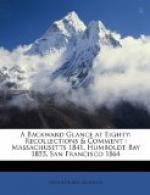On one occasion I narrowly escaped participation in warfare. In August, 1862, there had been outrages by daring Indian bands, killing unprotected men close to town. Once a few of us followed the tracks of a party and traced the marauders across Mad River and toward a small prairie known to our leader, Ousley the saddler. As we passed along a small road he caught the sign. A whiff of a shred of cotton cloth caught on a bush denoted a smoky native. A crushed fern, still moist, told him they had lately passed. At his direction we took to the woods and crawled quietly toward the near-by prairie. Our orders were to wait the signal. If the band we expected to find was not too large, we should be given the word to attack. If there were too many for us, we should back out and go to town for help. We soon heard them plainly as they made camp. We found about three times our number, and we retired very quietly and made for the nearest farmhouse that had a team.
In town many were anxious to volunteer. My mother did not want me to go, and I must confess I was in full accord with her point of view. I therefore served as commissary, collecting and preparing quantities of bread, bacon, and cheese for a breakfast and distributing a packed bag to each soldier. The attack at daylight resulted in one death to our command and a number to the Indians. It was followed up, and a few days later the band was almost annihilated. The plunder recovered proved them guilty of many late attacks. This was toward the end of the Indian war that had for so many years been disastrous to the community, and which in many of its aspects was deeply pathetic. Originally the Indian population was large. The coast Indians were spoken of as Diggers, and inferior in character. They were generally peaceful and friendly while the mountain dwellers were inclined to hostility. As a whole they did not represent a very high type of humanity, and all seemed to take to the vices rather than to the virtues of the white race, which was by no means represented at its best. A few unprincipled whites were always ready to stir up trouble and the Indians were treacherous and when antagonized they killed the innocent rather than the guilty, for they were cowards and took the fewest possible chances. I have known an Indian hater who seemed to think the only good Indian was a dead one go unmolested through an entire campaign, while a friendly old man was shot from behind while milking his cow. The town was near the edge of the woods and no one was secure. The fine character whom we greatly respected,—the debater of original pronunciation,—who had never wronged a human being of any race, was shot down from the woods quite near the plaza.




